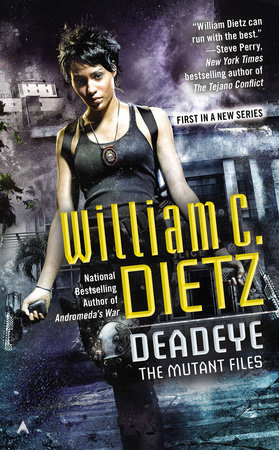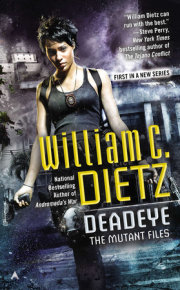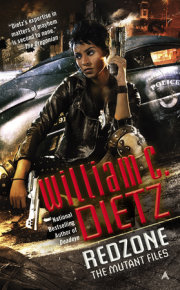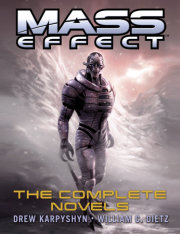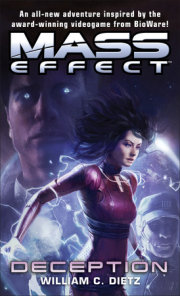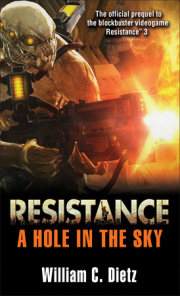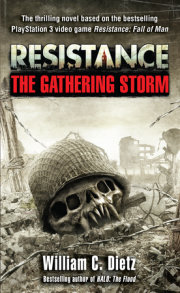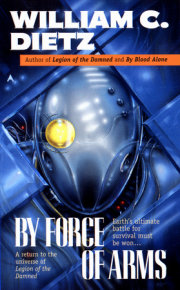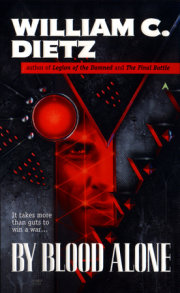ACKNOWLEDGMENT
ONE
THE AIR WAS deliciously cool as the sun rose, and the city of angels was flooded with pink light. The traffic light changed to green, and Police Detective Bryce Conti put his foot on the gas. He was driving an unmarked car. That was something of a misnomer, however, since the vehicle had been tagged so many times that it looked like a rolling Picasso. The radio was on, and Conti smiled as a patrol unit was sent to deal with a 288. That was the code for indecent exposure and usually meant that a drunk was wandering around a park without his pants. What a way to start a new day.
Conti’s destination was a neighborhood that had been called Little Italy prior to being reborn as New Chinatown in 1938. As Conti took a right, he passed the charred remains of a burned-out house. One of thousands left empty after the plague.
Some of the homes in the area were occupied, however, and easy to identify because they were the ones that had iron bars over the windows. And in some cases there were patches of carefully kept grass out front. God bless ’em, Conti thought to himself, and protect them from evil.
Conti found the address he was looking for halfway down the block and on the right. It was the type of four-unit building often referred to as a “dingbat.” A not-so-complimentary name that referred to thousands of formulaic three-story-high apartment buildings built during the middle of the twentieth century. A sign that read LA BUENA VIDA was fastened to the front of the structure’s dingy white facade.
Parking places were easy to find in a city where the population was half what it had once been. Conti pulled over, got out, and thumbed the remote. The lights flashed to signal that the car was locked.
Conti had been a street cop for six years and a detective for two. During that time, he had developed habits, one of which was to pause before parting company with whatever car he was using and perform a quick 360. Someone was watching. He could feel it. But he expected that. It paid to keep your eyes peeled in LA—and chances were that one of the neighbors was peering at him through partially opened blinds. Conti followed the path that led past the ground-floor garage back to where the stairs led up to the second floor.
Detective Lee lived in unit 201, and once Conti arrived he saw that the words FUCK OFF had been spray painted across the front door. Conti smiled. It looked like the stories he’d heard were true. He pushed the doorbell.
* * *
Cassandra Lee was searching for someone important. An alley led to a door that opened into a dark room that . . . She awoke with a jerk and opened her eyes. Bars of dusty sunlight slanted through the blinds to etch lines on the wall. The doorbell rang again.
Lee swore, rolled out of bed, and snatched the Glock off the dresser as she left the room. She passed the bath and took up a position next to the front door. Someone knocked. “Who is it?”
The voice was muffled. “Detective Conti.”
“Who do you report to?”
“Deputy Chief McGinty.”
There were three locks. Lee opened one after the other. “Come in.”
The door opened, and Conti entered. He was dressed in a sports coat, shirt, and jeans. She figured Conti was six feet tall, give or take an inch, with black hair and brown eyes. Rumor had it that he was a ladies’ man, and Lee could see why. The bastard had dimples, for God’s sake . . . They appeared as he smiled. “I was starting to wonder if I had the right place.”
“Sorry,” Lee lied. “Make yourself to home. I’ll get ready.”
* * *
Conti saw the weapon and watched as Lee placed it on a side table and walked away. As far as he could tell, the oversized tee shirt was the only thing she had on. It hung down over what he imagined to be a very nice butt. Her legs were bare and slim. He liked that. Don’t do it with your partner. That was the rule and a good one for the most part. But, depending on how things went, Conti was willing to make an exception.
He heard a door slam and the shower come on as he entered the living room. Drawn curtains made the space feel gloomy, and the brown paint made the situation worse. Interestingly enough, there wasn’t any of what he thought of as “girly stuff” in sight. No colorful prints, no stuffed animals, no flowers.
Two matching bookcases occupied the right-hand wall and were filled with cop memorabilia. That included photographs. Lots of them. Most featured a man with black hair, almond-shaped eyes, and high cheekbones. Lee’s father? Yes, a sergeant, judging from the chevrons on his sleeve.
In addition to the photos there was a plaque for marksmanship, a presentation nightstick, and a display case containing three medals. One of them was a Medal of Valor. The highest honor a cop could receive. Frank Lee had been a real fire-eater then . . .
“I’m ready.”
Conti turned to look at her. He’d seen Lee before but usually from a distance. She stood about five-five and might weigh 125. A halo of black hair framed her face. She had big brown eyes, a perfect nose, and full lips. Her clothing consisted of a waist-length leather jacket, khaki cargo pants, and lace-up combat boots. Conti watched as the Glock went into a shoulder holster, and something shiny slipped into the small of her back. “What was that?”
She looked at him. “What was what?”
“The backup . . . What is it?”
“It’s a Smith & Wesson model 627.”
Conti made a face. “A wheel gun, huh? I carry a Kel Tec P-11. I think semiautos are the better option.”
Lee’s eyes narrowed. “Who cares what you think? Let’s go.”
And with that she walked out through the door. Conti followed, checked to make sure that it was locked, and took the stairs two at a time. She was waiting next to the car when he arrived and extended a hand. “I’ll drive.”
“Why?”
“Because I don’t know you. Maybe you can handle a car and maybe you can’t. Time will tell.”
He placed the keys in her hand and watched Lee pull a 360 on the sedan, even going so far as to peer under it. Paranoia? Not really—a device placed by the Bombas Gang had been responsible for the death of 1-George-12 two weeks earlier. That meant any car that was left unattended, no matter how briefly, had to be checked.
After completing the 360, Lee slipped behind the wheel, and Conti got in beside her. Lee started the sedan, eased down the street, and took a right. More cars were out and about by then. Most of them were one-offs manufactured by various fabricantes. Form followed function in most cases, but there were some especiales as well. They were sleek affairs, low to the ground in most cases and tricked out with fanciful paint jobs.
The police officers were headed south on North Main Street by then. Lee pulled over to the curb six blocks later. Conti checked his watch. “It’s 6:50. Roll call begins in ten minutes.”
“You need one of Maria’s breakfast burritos,” Lee informed him. “Wait here, I’ll be right back.” Then she was gone.
All Conti could do was sit and fume as Lee entered a tiny hole-in-the-wall restaurant and soon emerged with a cardboard box. She passed it through the passenger-side window. “I stop here every morning,” she explained. “I hope you like ham and scrambled eggs because that’s what you got.”
As Lee drove, both of them ate. And Conti, who was having his second breakfast of the morning, had to admit that the burrito was good. As was the coffee. Aztec coffee brought north through San Diego.
Both were still in the process of eating as they arrived at police headquarters. The building’s facade consisted of two triangles. One was made of reflective glass and positioned at a right angle to the other. A real statement back in the day but not so pretty since the rocket attack five years earlier. The city council still hoped to restore the original look but hadn’t been able to find the right kind of glass.
Lee drove down into the underground parking garage. After showing their ID, the officers were allowed to proceed through the checkpoint and down the ramp. Lee chose a parking spot in a row of vehicles similar to their own. “We’re ten minutes late,” Conti said, “McGinty’s going to have a cow.”
“Screw McGinty,” Lee said darkly. “And the lieutenant he rode in on.”
Conti sighed and followed her inside. Nobody liked Lee—nobody he’d met, anyway. So why was she still around? The answer could be summed up in a single word: results. She solved crimes, she caught perps, and she was so good with the Glock that the uniforms at the practice range called her Deadeye. Which was why he wanted to ride with her. To learn what she knew.
* * *
An elevator carried them up to the sixth floor to the Detective Bureau. After more than a half century of hard use and tight budgets, the walls were a dingy green, filing cabinets crowded once-wide hallways, and offices were crammed with tiny cubicles.
Lee could see that, knew that, but couldn’t fully connect with it. Because the building would always be a special place for the little girl inside her. It was the place where the good guys worked, where the bad guys got caught, and justice was done.
That’s why she had joined the force right out of college and remained part of it. Even if she had come to realize that some of the good guys weren’t so good, some of the bad guys weren’t so bad, and that “justice” was often in the eye of the beholder.
The sixth floor was home to the Chief of Detectives, her staff, and about sixty “real” detectives. “Real” being Lee’s designator for people who logged more street time than chair time. All of them were housed in an open area that had been subdivided into a maze of cubicles called the bull pen.
Of the larger force, only twelve men and women were members of the elite Special Investigative Section charged with going after the city’s most dangerous criminals and taking them off the street. That was the unit Lee belonged to—and the one Conti wanted to join. She led him back to the corner where half of the S.I.S. detectives were gathered around a long table. All of them were dressed in variations of street clothes and said their hellos as Lee and Conti sat down.
Deputy Chief of Detectives Ross McGinty was there along with Assistant Chief Sean Jenkins. What hair McGinty still had was military short. His eyes were the color of faded denim, his face was narrow, and his lips were thin. “Well, well,” he said. “What have we here? Detective Lee and Detective Conti. A word to the wise, Conti. In spite of what Lee may have told you, members of the S.I.S. team are expected to show up for roll call on time.”
Lee smiled sweetly. “Conti made me stop for breakfast burritos. That’s why we’re late.” Nobody believed that, and, with the exception of McGinty, all of them laughed.
They spent the next half hour on HR stuff, arrangements for an interdepartmental softball game, and updates on active cases. “Thanks to Detective Howe and his team, the Bradley brothers are living in the slammer now,” McGinty told them. “But our work is never done. Now there’s a new set of assholes to deal with. They call themselves the Freak Killers, or FKs, and claim to be folk heroes out to protect norms from the plague.”
He looked from face to face. “And they are mutant killers. They’re killing mutant merchants who enter the city on short-duration visas. There have been three murders so far, which means we need to find the FKs and do it fast. Once this meeting is over, Lee and Conti will report to my office for a briefing.”
Lee felt a rising sense of anger. The mutant thing was a shit detail . . . McGinty’s way of punishing her for calling him “a jerk” two weeks earlier and for being her father’s daughter. Frank Lee and Ross McGinty had been partners once. Back when both men were patrolmen. And, according to the stories she’d heard, they’d been friends. Then something happened. No one knew what led up to it, but there had been a fistfight. McGinty came out on the losing end of it and, according to departmental lore, had been pissed off ever since.
The meeting ended shortly thereafter, and the two detectives followed McGinty to his office. Jenkins, coffee mug in hand, brought up the rear.
In contrast to many of his peers, the walls of McGinty’s office bore no pictures of him shaking hands with the mayor, accepting a commendation, or fly-fishing. And every item on his desk had a purpose. It was as if everything about the inner man was locked away. “Okay,” McGinty said as he pushed a pair of manila folders across the desk. “Here’s what we have on the Freak Killers. They are both an underground hate band and a gang. Their leader is a three-time loser named Cherko. His street name is Popeye.”
Conti opened his folder. “Like the cartoon character?”
McGinty shook his head. “Nope. This Popeye has protruding eyes. Thus the name.”
Lee was looking at a mug shot by then. Cherko had no visible eyebrows, which served to make his bulging eyes even more noticeable. In that particular photo, he was sporting a nose stud, a “fuck-you” smile, and a goatee that was supposed to hide a weak chin. “So what have we got?”
Jenkins had black hair, green eyes, and brown skin. “Popeye has a tendency to shoot witnesses,” he replied. “But one of them survived. She was married to victim three. We have a hold on her.”
“How ’bout family?” Conti wanted to know. “Does this piece of shit have one?”
“He had a mother as of six months ago. That’s when he was released from Corcoran,” McGinty answered. “But it looks like she has moved since then. Another family is living in the apartment now.”
“Or Cherko moved her,” Jenkins offered. “It’s all in the report.”
“Okay,” Lee replied. “That brings us to Conti here.”
McGinty frowned. “How so?”
“I don’t want a partner.”
“Nobody cares what you want.”
“He’ll get himself killed, or worse yet, get me killed.”
“You’re way out of line,” Jenkins said ominously. “Conti has an outstanding record. That’s why he’s being considered for the S.I.S.”
There was a long moment of silence. Lee looked from face to face and knew it was time to back off. “Okay . . . We’ll find Cherko.”
McGinty looked as if he might be about to say something, didn’t, and nodded. “Get out of my office.” They did.
* * *
Lee left the office, cut across the room, and was out in the hall by the time Conti caught up with her. He reached forward to grab an arm, and she turned on him. “Don’t touch me.”
Conti allowed the hand to fall away. He was angry and let it show. “What was that all about? You don’t even know me!”
As Lee looked at him, Conti saw something unexpected in her eyes. Sadness? Yes, he thought so. “No,” she said quietly. “I don’t know you. And I don’t want to. Because if I do, I might come to like you—and the people I like have a tendency to die. Look it up Conti . . . I’ve had five partners since I joined the force. Two of them are dead.”
Conti shook his head. “I don’t need to look it up. I did my research . . . And three of them are alive.”
Lee looked away, then back again. “Okay, Romeo . . . Have it your way. Let’s find Popeye.”
After retrieving the car from the parking garage, Lee drove it up and out into bright sunshine. She put a pair of shades on at a traffic light, checked the rearview mirror, and drove the car onto 101. That took them east to the North Soto Street exit. From there it was a short ride to Morengo, State Street, and the hospital.
It had been the Los Angeles County General Hospital once. But that was before a terrorist who called himself Al Mumit (the taker of life), turned Bacillus nosilla loose on the world in 2038. The bioengineered bacteria was delivered to Kaffar (unbelievers) all around the world by 786 shaheed, or martyrs. Some were elderly couples, some were students, and some were infants. All chosen because they had spotless records, looked Western, or were clearly innocent. Like the babies.
Twenty-two of them were prevented from entering the country they had been ordered to attack for one reason or another but the rest got through. Once they became ill, the shaheed sought out sports events, music festivals, and transportation terminals. Any place where there were lots of people.
The results were just what Al Mumit had hoped for. Bacillus nosilla spread, thousands fell ill, and unknowingly communicated the disease to others. Within a matter of weeks, hundreds of thousands were infected—and they swarmed hospitals like Los Angeles General demanding a cure that didn’t exist.
Sadly, people who were trying to get medical attention for the flu or some other common ailment contracted the plague while waiting in line. Some of them dropped dead and were stacked like cordwood until such time as hazmat-suited sanitation crews could come and haul the bodies away.
Lee hadn’t been born yet. But her father was twenty-three at the time and a street cop. He told her about the panic, the lines that stretched for miles, and the violence that took place as people tried to crowd in. Neighboring Hazard Park had been fenced off and turned into a holding area where exhausted medical personnel worked day and night to sort people into three categories: those who were dying, those who might be infected, and those who were okay. Unfortunately, very few people fell into the third group.
Some people survived the disease but suffered terrible mutations because of it. Of that group, some were carriers, and others weren’t. That made no difference however. “Norms,” meaning those who were found to be free of disease, didn’t want to mix with those who were infected, or to witness what B. nosilla did to its victims. So the mutants were forced into “recovery camps.”
But it wasn’t long before the recovery camps were referred to as “relocation camps,” and the mutants were shipped east into states like Idaho, Nevada, and Wyoming. Meanwhile, a similar sorting process was taking place in other parts of the country. That resulted in the creation of norm-run states like Pacifica on the West Coast, Atlantica in the Northeast, and the Commonwealth in the Midwest.
Meanwhile, mutants took charge of the Republic of Texas, which lay east of Pacifica, as well as the New Confederacy in the Deep South. Territorial disputes had been common during the early years, and wars had been fought, but a new normal had evolved. And the government of Pacifica wanted to preserve it.
The sign over the entrance to the hospital read: THE CALIFORNIA CENTER FOR INFECTIOUS DISEASES. But in all truth it was there for the purpose of treating one disease, and that was Bacillus nosilla. Before they could enter the hospital, the detectives had to pass through the screening center and put on disposable masks with the word VISITOR printed across them.
Most of the staff were wearing masks that had been customized to look arty, funny, or featured caricatures of themselves. Such devices were popular on the streets as well—where many wore them for extra protection. Because so-called passers, meaning mutants who looked normal enough to “pass” as norms, continued to infiltrate Pacifica, hoping to better themselves.
After showing their IDs to the security guard at the front desk, the detectives were allowed to enter the lobby beyond. The witness’s name was Reba Fuentes, and she was staying in room 326, awaiting a clean bill of health and the legal clearance that would allow her to leave LA.
An elevator took the detectives to the third floor, where the doors opened onto a nurses’ station. Conti showed his ID, and the detectives were sent down a hall to room 326. The door was partially ajar, and Lee knocked. A female voice said, “Come in.”
After pushing the door open, Lee stepped into a small, cell-like room that had a window, a hospital bed, and hookups for various types of medical gear. A woman stood as they entered. Like most females traveling in norm-controlled territory, she was dressed in a head-to-toe burqa or “baggie.” It was midnight black, and all Lee could see were two brown eyes. And even they were partially obscured by a strip of horizontal mesh. “Mrs. Fuentes?”
“Yes,” Mrs. Fuentes said hesitantly. “They told me that someone would come.”
The woman’s voice was soft and had a tremulous quality. Lee could understand that. Mrs. Fuentes had lost her husband, was a long way from home, and surrounded by millions of people who feared and in some cases hated her. “I’m Detective Lee—and this is Detective Conti. We’re here to talk to you about your husband’s murder.”
There was only one chair, and the room felt crowded. “We passed a lounge on the way in,” Lee said. “It was empty. Why don’t we talk there?”
* * *
Mrs. Fuentes allowed the detectives to accompany her to the lounge. She could smell herself and wondered if the normales could do so as well. It was difficult to keep up with the drainage. Gary had sworn that he couldn’t smell the pus, but that was a lie. “A love lie,” her mother called it—and proof of his feelings for her. And now he was dead. Killed the way she would swat a fly.
Were the normales really trying to find Gary’s killer? Or were they going through the motions? From what she could see, the woman was pretty . . . Like the pictures in old magazines. It was difficult to believe that such a person would avenge her Gary.
* * *
Lee ushered Mrs. Fuentes into the lounge and closed the door. There was a table and chairs to sit on. Conti placed a small device on the surface between them. “This machine will record everything we say.”
Through a combination of good luck and skill, most of Pacifica’s commercial infrastructure was still up and running. But according to news reports, tech-related services were spotty in the Republic of Texas, where some residents saw the plague as a message from God. Specifically, Revelation 15:1. “And I saw another sign in heaven, great and marvelous, seven angels having the seven last plagues; for in them is filled up the wrath of God.”
Mrs. Fuentes nodded. “I know about such devices. That’s why Gary and I came to Los Angeles. We have a shop . . . Had a shop . . . Where Gary would take broken machines and make them function again. But he needed parts, so we came here to buy them.”
The burqa rustled as Mrs. Fuentes brought a white handkerchief up to dab at her eyes. There was something universal about the gesture and the grief associated with it. “I’m sorry,” Lee said sympathetically. “I really am. But we need to hear what happened so we can find the person who killed Gary.”
Conti cleared his throat. “That’s right. What happened?”
Mrs. Fuentes looked down at her lap. “We crossed the border at the Blythe checkpoint. Then we rode a bus to LA and rented a room in Freak Town. Gary placed an ad on the computers that night.”
“The Internet,” Conti suggested.
“Yes, the Internet.”
“What did the ad say?” Lee wanted to know.
“It said that Gary wanted to buy used hard drives, video cards, and old motherboards.”
Conti turned to Lee. “Chances are Popeye looks for ads like that . . . He knows it’s the sort of stuff a mutant would buy—and that a mutant would have to carry gold.”
Lee looked at Mrs. Fuentes to see if Conti’s use of the word “mutant” would bother her. The mesh in front of her eyes made it hard to tell. One thing was for sure however . . . Something smelled, and Lee thought it was Mrs. Fuentes. Almost anything could be concealed under the baggie. A shriveled limb, a misshaped torso, or an open abscess. “Yes,” Mrs. Fuentes said. “The ad was a mistake. But it was our first trip, and we didn’t know.”
“Of course you didn’t,” Conti said sympathetically. “So you were there? You witnessed what happened?”
“Yes. The man you call Popeye sent a message. He said he had components to sell. Gary agreed to meet him across from a restaurant in Compton. We went there by taxi. I wanted to keep the car, but Gary said no, that would cost too much money. So we waited. A gray especiale passed us two times.”
“They were checking you out,” Lee observed. “Looking for a trap.”
“Then the car stopped,” Mrs. Fuentes said. “A man got out. He had bulging eyes and rotting teeth.”
“This man?” Conti inquired as he pushed a picture of Cherko across the table.
“Yes.”
“So he wasn’t wearing a mask.”
“No.”
“What happened after that?”
“The man got out of the car and spoke to Gary. I was too far away to hear what was said. But it was only a minute or two before the man pulled a pistol and shot my husband in the chest. Then he spit on him and called him un maldito mutante.
A fucking mutant, Lee thought.
At that point, Mrs. Fuentes started to sob, and Lee circled the table to put an arm around the other woman’s shoulders. The smell was worse than before. “Then what happened?” Conti asked.
“I ran. He shot me in the back. The impact threw me forward. It hurt, but I knew he would come, so I played dead.”
Lee returned to her seat. “And it worked.”
“Yes. He kicked me. It was hard to remain silent, but I did. Then he went back to get Gary’s money belt.”
The interview came to an end shortly after that. Lee signed the legal release that would allow the mutant to leave the hospital—and promised to let her know when they caught Popeye. “So,” Lee said, as they left. “Tell me, Romeo . . . What, if anything, did we learn?”
“Not a damned thing. Everything she said was in the initial reports.”
“That’s right,” Lee agreed. “You were paying attention.”
“Does that mean I can drive the car?”
“Hell, no.”
Conti grinned. “Just checking.”
They went to lunch after that, followed by a long afternoon spent chasing leads that didn’t produce anything. Around four thirty, Lee parked the car in front of her apartment. Lee got out and Conti came around to the driver’s side. “One last thing,” Lee said as she looked up at him. “You gave Mrs. Fuentes something just before we left. What was it?”
Conti looked embarrassed. “Fifty bucks.”
“You’re a sucker. You know that.”
“Yeah, I know.”
“Here’s twenty-five,” Lee said as she peeled some numoney off a small roll and handed it to him. “I’ll see you in the morning.” Conti wanted to say something, but Lee was walking away.
Once inside her apartment, Lee traded her street clothing for a tee shirt and shorts. Then she went out for a five-mile run. The badge and the revolver added some weight but made her feel more secure. Lee was careful to vary the routes she used, but all of them took about thirty minutes.
After returning to the apartment, she showered, microwaved the same chicken-and-veggie dinner she ate every night, and sat down to watch the news. None of it was very encouraging. B. nosilla was continuing to mutate while scientists searched for a cure . . . And it did so with such speed that they hadn’t been able to catch up.
There were rumors that a terrible storm had devastated coastal Atlantica. Forest fires continued to rage unchecked in Washington State. And based on some iffy reporting, norms in India were battling mutants from China. It seemed like the whole world was fucked up. Lee sighed and turned the TV off.
In keeping with a long-established routine, Lee dumped the empty container into the trash and put a load of laundry in the washer. Then it was time to start her second job—which was to find the person or persons responsible for her father’s death.
Lee made her way back to the second bedroom. What had been her father’s bedroom before his death. She’d been living in her own place back then—and moved into his apartment a few days after the funeral. The theory was that maybe, just maybe, she’d find something in among Frank Lee’s effects that would help to solve his murder. That hadn’t occurred as yet, but she was determined to keep working the case until someone solved it.
There was nothing elegant about the hasp and combination padlock on the door, the primary purpose of which was to keep Mr. Henry out. He handled maintenance for the building and was an inveterate snoop. But it was more than that. The room and everything in it was private. A window into Lee’s soul that she planned to keep closed.
Lee entered her father’s badge number into the lock, heard the usual click, and removed the lock. The single window was blacked out, so it was dark until she flipped the track lights on. They lit walls that were covered with a mosaic of photos, diagrams, and notes. They were held in place by hundreds of multicolored pushpins. Enough pins to ruin the wall and cost her money when the time came to move out. But that would mean her father’s murderer had been found—and for that she would gladly pay.
It wasn’t just her father, however. No, eight policemen and -women had been killed over a period of fourteen years, all victims of the serial killer called the Bonebreaker. A psycho who liked to dismember his victims and mail broken bones to the police.
But why? The Bonebreaker had a grudge against the police department. That was obvious. But there were thousands of people who had reason to hate the LAPD. So in the absence of eyewitnesses or other evidence, the team assigned to the case was spinning its wheels. And because of her connection to a victim, Lee had been instructed to stay clear of the investigation. An order which, like so many others, she chose to ignore.
Her father’s bed had been removed and replaced with a utilitarian worktable. As was her habit, Lee started on the left side of the room and began to circle around it. Her hope was that by scanning all of the latest bits and pieces, something would click. It didn’t.
Acting on an impulse, she removed an old-fashioned photograph album from the shelving unit on the north wall and carried it over to the table. The technique was far from reliable, but every now and then, a random excursion into such materials served to trigger a new thought or a new line of inquiry.
Lee opened the album and began to page through it. According to the handwritten dates, it covered the period of time just prior to the plague. There were pictures of Frank Lee posing with the departmental baseball team, standing next to his cruiser, and receiving medals. But one photo stood out. She’d seen it before, of course. Hundreds of times. But the events of the day caused her to pay more attention to it.
Lee kept a magnifying glass on the worktable—and once she looked through it, her first impression was confirmed. Her father and a much younger Ross McGinty were in uniform. And there, standing between them, was a young woman.
Could it be her mother? No, her mother had very dark skin, and the girl was lighter. So, who was she? The date under the photo fell after the release of the plague and the now-famous fistfight. Had the girl been involved somehow? Who cares? Lee thought to herself. That was then. This is now. She went to bed an hour later. There were dreams, lots of them, and none were good.
TWO
THE BEEP OF Lee’s alarm merged with the sound of the doorbell to pull her up out of a troubled sleep. She slapped the clock, knocked it onto the floor, and swore as it continued to bleat. The plan was to be up and dressed by the time Conti arrived, and the bastard was early!
Lee rolled out of bed, silenced the alarm, and grabbed the Glock on her way out of the room. Then she took up her usual position next to the front door. “Who is it?”
“Conti.”
After dealing with the locks, Lee opened the door. She was about to chew him out when he gave her a familiar-looking box. “It’s a breakfast burrito,” he said. “From Maria’s.”
It was a plan. An evil Conti plan to arrive at roll call on time, avoid McGinty’s wrath, and become chief of police. Lee wanted to say something cutting but came up empty. So she put the box on the kitchen counter and walked away.
“No need to thank me,” Conti said as he took his breakfast over to the table. “That’s what partners are for.”
Conti’s plan worked. Not only did they arrive for roll call on time—they were five minutes early. And that caught McGinty by surprise. “Well, well,” the deputy chief said as he entered the room. “This is a first—1-William-3 is on time. Make a note, Sean . . . Miracles can happen.”
Lee scowled, and Conti kept his face professionally blank. Once the departmental bullshit was out of the way, Jenkins turned to Lee. “I have some good news for you . . . Cherko’s mother applied for welfare. That triggered an alert that came straight to me. We know where she lives.”
Lee felt a sudden surge of optimism. She knew that Mrs. Cherko had gone to see her son in prison. So it stood to reason that he would visit her. All they had to do was watch and wait. “Now we’re talking,” Lee said. “Where is she?”
“Right off the corner of Fairfax and Colgate,” Jenkins answered. “Here’s the address.” He pushed a scrap of paper across the table, and Conti accepted it. Lee knew the area. It had been home to lots of Russians, Armenians, and Mexicans prior to the plague. Many years had passed, but the neighborhood still retained some of its original flavor, and the Cherkos might have connections there.
“We’ll go twelve on and twelve off,” McGinty said. “I would prefer eight-hour shifts, but we’re shorthanded.”
That was always the case and came as no surprise to either detective. Lee stood. “We should hit the street . . . If that’s okay.”
McGinty nodded. “Go for it. And watch your six.”
West 3rd took them most of the way. The apartment house was situated on one corner of a busy intersection. And there was a bank, convenience store, and a parking lot. Lee turned into it and chose a slot that would provide an unobstructed view of Mrs. Cherko’s front door. Once the stakeout was in place, all they had to do was wait for Popeye to show, call for backup, and arrest the piece of shit when he came out.
Time seemed to creep by. People came and people went, but there was no sign of Popeye. The only break in the monotony came when Conti made the midday chow run to the convenience store. He came back with a bag full of crusty taquitos—plus two ice-cold soft drinks, both of which were loaded with caffeine. “That’s it?” Lee demanded. “You spent my money on two thousand calories’ worth of taquitos? There weren’t any salads?”
“I didn’t look for salads,” Conti confessed. “Besides, why eat a salad when you have taquitos?” So Lee ate a taquito and left the rest for Conti, who polished them off in five minutes.
Then the boredom set in once again. And it was getting warm. Very warm. But they couldn’t run the AC without running the engine—and that would give them away. So they cracked the windows, but it didn’t make much difference. Both were down to body armor and tee shirts by that time, but it was at least eighty degrees inside the car.
Forty-five minutes crawled by. Lee was slumped behind the wheel, willing Cherko to show, when she spotted movement in the outside rearview mirror. “Uh, oh . . . We have company.”
Conti was laid out on the backseat listening to a retro band called The Eagles. He jerked the earbuds out as he sat up. “Whacha got?”
“A car prowl . . . And we’re sitting in the car this jerkweed wants to break into.”
Conti looked out through the tinted window and saw that a male suspect was coming their way with a ball-peen hammer in his right hand. A smash and grab then . . . A low van could be seen behind the man, with its side door open. “I’ll take care of it,” Conti said as he put on his jacket. Then he got out.
Lee laughed as she watched in the mirror. The would-be thief did a double take as a large man exited the car, produced an elaborate yawn, and began a series of stretches. That was sufficient to send the car prowler back to the van. He entered, pulled the door closed, and the vehicle took off. Unfortunately, that was the only thing that happened until 6:00 P.M., when the second team took over.
It had been a long, frustrating day, and Lee was happy to return home. By the time Conti dropped her off, it was nearly seven o’clock and way past the time when she normally ran. Should she force herself to do it? Or push it off?
Suddenly, she felt the same prickly sensation she experienced when somebody eyeballed her in a club. But she wasn’t in a club. She was standing in front of her apartment house.
So who is it? Lee wondered as she took a look around. A snoopy neighbor? That was certainly possible. Yet for some reason buried in the reptilian part of her brain, Lee didn’t think so. She felt an urge to seek the safety of her apartment.
That aspect of her brain wasn’t in charge, however. And rather than run from the things that frightened her, Lee continually forced herself to confront them. So she chose the vacant house on the other side of the street as being the most likely place for a “looker” to hide and walked straight toward it.
If that elicited a response, she couldn’t see it. Her combat boots made a thumping sound as she climbed the front stairs and rattled the door. Lee figured that stealth would be pointless if someone was watching and hoped that being assertive would provide something of an edge.
Having failed to gain entry through the front door, Lee made her way along the north side of the house. A narrow ribbon of cracked concrete led her between clumps of overgrown bamboo, past a sad-looking rosebush, and into a yard filled with trash. Lee drew the Glock and held the barrel straight up as she climbed a short flight of stairs to a screen door with a hole in it. It produced a horrible screeching noise as she pulled it open. That revealed a wooden door that had been left partially ajar. Tool marks could be seen where it had been jimmied. Lee stood to one side with her weapon at the ready. “Los Angeles Police!”
There was no response. Lee paused a moment before entering the kitchen. The place had been ransacked more than once judging from the way things looked. It was nearly dark outside, so Lee removed a small flashlight from an inside pocket and held it away from her body as she entered the dining room. The floor was littered with empty beer cans and fast-food containers. A sure sign that one or more homeless people had camped there at some point.
Glass crunched under Lee’s boots and a blob of white light roamed the walls as Lee made her way into a Craftsman-style living room. The front windows were covered with blinds. But the streetlights were on, and strips of greenish light were visible through the slats. Was that where the looker had been standing? Staring out through filthy glass? Probably. Assuming her instincts were correct.
As the light tilted up, Lee saw something that made her blood run cold. Because there, written in red spray paint, was the name BONEBREAKER. She felt a stab of fear and whirled, ready to defend herself. But she was alone. If the Bonebreaker had been there, he was gone.
So what to do? She could let the Bonebreaker team know, in hopes that they might find some sort of evidence in the house, but was a name on a wall enough to justify that? No, Lee decided, it wasn’t enough.
It did scare the hell out of her, however, and Lee was happy to leave the house. Five minutes later, she was in her apartment and changing into some sweats. Then it was time to zap her dinner and carry it into the evidence room. It wasn’t the first time she had eaten there and wouldn’t be the last.
Assuming the name had been spray painted onto the wall by the killer himself, the first question was why? To spook me, Lee decided. To elicit fear. If so, it was working.
What did that mean? That he was stalking her? That she was the next person on his hit list? Maybe. Although there was no clear indication that the Bonebreaker had a list. All of his victims were cops. That much was glaringly obvious. But beyond that, the homicide detectives had never been able to come up with a common denominator. Not age, race, or gender. The Bonebreaker was an equal-opportunity killer.
Lee ate as she reviewed her records, which was to say a bootleg copy of the department’s records, looking for mention of precrime warnings or signs. There weren’t any. So either the spray-painted name had been put there by someone else, or it represented a new behavior on the killer’s part.
Don’t jump to conclusions, Lee told herself. What if there were previous postings? But nobody noticed them? It was a good question. Because the odds were against anyone’s noticing a name spray painted inside an abandoned house. It wasn’t a crime scene after all—and the entire city was covered with graffiti. The discovery felt important at first, but after giving the matter some additional thought, Lee realized that it wasn’t. The police couldn’t monitor all of the city’s tags checking for what might or might not be a warning.
No, the discovery wouldn’t lead to the killer. But it was another entry in the profile that Lee was trying to construct. Assuming the killer had been there and written on the wall, it might mean that he or she had accepted the name bestowed upon him or her by the media and come to take pride in it. Did that stem from ego and narcissism? That was possible. If so, those characteristics might cause him or her to make a mistake someday. Lee would be waiting.
* * *
The sun was up, and it promised to be another hot day as Conti turned the corner and drove down the street. He’d been out the night before, partying with some of his buddies, and wound up in bed with a blonde he barely knew. What he needed was a steady girlfriend. Somebody to spend evenings with—somebody who had a brain. Like Lee? Yes, the girl was smart and hot to boot. She was serious though . . . Haunted even. Could he make her happy? It would be fun to try.
Conti parked the car, made his way up to Lee’s apartment, and pushed the button. The doorbell had just started to ring when someone jerked the door open. And there, much to Conti’s amazement, stood Cassandra Lee. All dressed and ready to go. “Come in,” she said. “The coffee is ready.”
Conti followed her in, surrendered the box, and made his way over to the kitchen table. Lee put the burritos in the microwave for thirty seconds before bringing them over. The coffee came next. “No need to thank me,” she said. “That’s what partners are for.”
Conti chuckled, and they ate in a companionable silence. Once she was done, Lee was up and out of her chair. “Let’s get going.”
“What’s up?” Conti wanted to know. “You’re kind of hyper this morning.”
“This is the day,” Lee predicted. “This is the day we’re going to nail Popeye.”
“So what is this? Woman’s intuition?”
“Maybe . . . It’s a feeling, that’s all.”
They couldn’t attend the 7:00 A.M. roll call. Not and relieve the second team at six. So Lee drove straight to the corner of Colgate and Fairfax, where she pulled into the parking lot.
A brief radio conversation was enough to bring Conti and Lee up to date. It seemed that though Mrs. Cherko had crossed the street to visit the convenience store, there had been no sign of her son.
The morning passed much as the previous one had. Conti listened to tunes in the front passenger seat, the temperature continued to climb, and it wasn’t long before they started to sweat. Conti was about to go for some cold soft drinks when a low-slung especiale rolled past. The body was sleek and somewhat reminiscent of the production vehicles from the fifties but covered with gray primer. As if the owner was saving up for a custom paint job. Then Lee remembered. The vehicle Mrs. Fuentes described had been gray as well.
The car slowed in front of the apartment house and crept past. Could it be Popeye? Checking the situation out?
“Did you see that?” Lee said as she brought the camera up. “A possible rolled by. Let’s see if he comes back.”
They didn’t have to wait for long. The smoke gray sedan reappeared in the intersection, took a right, and began to creep past the apartment building. Lee continued to click away as the car passed them. “I think Popeye is going to drop in on Mommy,” Lee said. “So pull your shit together and . . .”
“Sorry to interrupt,” Conti said. “But we have a 211 at the bank. I see what might be a flash mob out front. At least some of them are armed. We’re going to need backup.”
And with that, Conti was out of the car and drawing his weapon. Lee shouted, “No! Wait!” But it was too late. Conti was striding across the parking lot by then.
“This is 1-William-3!” Lee shouted into the mike. “We have a 211 at Colgate and Fairfax with multiple 417s.” Then, knowing what was about to happen, she added: “Shots fired. Request backup.”
Lee drew the Glock as she bailed out of the car and began to run. Conti was out in the middle of the intersection by then, waving cars off with one hand while pointing his pistol with the other. “Los Angeles Police! Drop your weapons!”
Beyond Conti, gathered in front of the bank, were a dozen people all wearing black-and-white skull masks. Roughly half of them were carrying long arms, and the rest were waving pistols, as the front door slammed open and a skull emerged carrying a bag.
Conti fired, and one of the perps did a neat pirouette before collapsing. Lee yelled, “Get down!” but Conti seemed determined to smoke another bank robber. He fired, staggered as a volley of bullets hit him, and fell.
Lee was in a cold fury as she made her way through a maze of vehicles and emerged with her gun raised. “Los Angeles Police!” she shouted, as half the skulls turned to shoot at her. A bullet nipped at her left shoulder, another whipped through her hair, and a third creased her side. So Lee shot a perp in the face and felt everything slow down.
It had always been like that for her. According to what she’d read, some ballplayers had it, too . . . It being the strange ability to see the round thing coming at them, make the necessary adjustment, and swing the bat just so. And that’s how it was for her as the Glock swung from target to target, seemingly firing of its own volition. As people fell, Lee began to advance on the spot where Conti was lying in a pool of blood.
Sirens could be heard by then, but Lee knew the battle would be over by the time help arrived. So it was necessary to put all of her adversaries down before they could shoot anyone else. Suddenly, the Glock clicked empty signaling the fact that all sixteen .9mm bullets had been expended.
There wasn’t enough time to reload, so Lee pulled the Smith & Wesson. She was in the process of bringing it up when a sledgehammer struck her chest. She staggered but managed to keep her feet. The revolver jerked twice, and blood misted the air as a skull dropped his weapon in order to grab the holes in his neck.
As he staggered away, Lee dropped a robber with an AK—and took a shot at a perp who was trying to escape. The first bullet missed but the second hit the back of his right knee. He screamed and went down hard.
Then Lee found herself face to mask with a single skull. He was aiming a .45 at her even as she pointed the .357 mag at him. “That’s a revolver,” he said. “And you’re empty. Good-bye, bitch.”
Lee pulled the trigger twice and watched both slugs hit his chest. He fell over backwards with arms outflung and lay staring up into the blazing sun.
Lee flipped the cylinder open and pushed the extractor rod. The empty shell casings produced a tinkling sound as they hit the pavement. “This is a fucking Smith & Wesson 627,” Lee said conversationally. “And it holds eight rounds.”
The speed loader made short work of reloading the weapon, which went back into its holster as Lee knelt next to Conti. There was a lot of blood. And when she pulled his shirt open, there was no body armor to be seen. The heat . . . Conti had left the armor at home because of the heat. Lee swore, and Conti opened his eyes. His voice was little more than a croak. “That’ll teach ’em,” he said. “I’ll bet they’re sorry now.”
“Don’t talk,” Lee said. “The EMTs will be here in a sec.”
“How bad is it?”
Lee pretended to look. “Not bad at all. You’ll be up and around in no time.”
Conti tried to smile, but it looked more like a grimace. “Good. Will you let me drive?”
Lee nodded. “Yes, Bryce. I’ll let you drive.”
Conti coughed. Blood dribbled down his chin. “Bryce? You never call me Bryce.”
“Don’t die on me, Romeo . . . Don’t do it,” Lee said desperately. But Conti couldn’t hear. The light was gone from his eyes.
. All rights reserved. No part of this excerpt may be reproduced or reprinted without permission in writing from the publisher.

